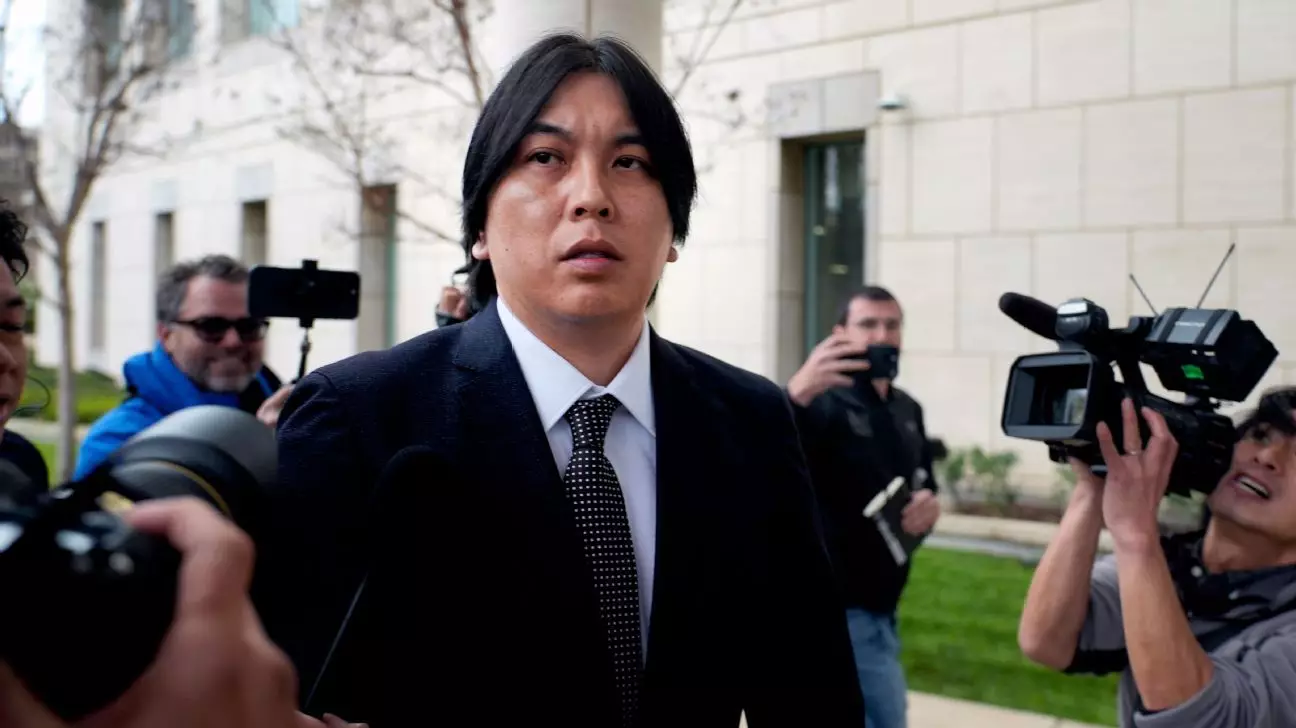The criminal case against Ippei Mizuhara is more than just a story about theft; it encapsulates the vulnerabilities that exist in relationships built on trust, the perilous depths of addiction, and the heavy toll of loss when both personal and professional boundaries are overstepped. Detroit’s own Mizuhara, who once stood as a beacon of cultural bridge-building between Japan and Major League Baseball, found himself in a precarious quagmire after stealing a staggering $17 million from renowned baseball player Shohei Ohtani. This case serves as a stark reminder of how quickly one’s fortunes can unravel in the face of betrayal and poor choices.
The fallout began earlier this year when an ESPN investigation uncovered Mizuhara’s duplicitous dealings. As a former interpreter for the Los Angeles Dodgers, he held a privileged position, one that granted him close access to Ohtani, a player who was viewed as a household name and a significant figure in baseball. Mizuhara’s role was not just about communication but also about fostering a sense of trust and understanding within the professional environment. Yet this trust was shockingly dismantled when it was revealed that Mizuhara had been siphoning off funds from Ohtani’s account to pay off gambling debts to an illegal bookmaker. What was once a harmonious relationship turned into a courtroom drama, illustrating how the nuances of personal connections can be exploited for personal gain.
When Mizuhara appeared before U.S. District Judge John W. Holcomb, the gravity of his crimes was laid bare. Sentenced to 57 months in prison with an additional three years of supervised release, Mizuhara’s fate served as both a punishment and a cautionary warning. The resulting reparations included nearly $17 million to Ohtani and an additional $1.1 million owed to the IRS, underscoring the profound financial and emotional impact his actions had on his once-close confidant. Judge Holcomb’s reflection on the “shockingly high” nature of the theft highlights a profound truth: most people never see such sums of money, casting Mizuhara’s actions in a cold light of desperation and disillusionment.
Underlying Mizuhara’s criminal behavior was a long-standing gambling addiction, which his defense attorney, Michael G. Freedman, sought to highlight in their plea for a more lenient sentence. Freedman pointed out that Mizuhara faced overwhelming debts—over $40 million—incurred over two years of continuous betting, suggesting that this addiction fueled his thievery. However, prosecutors presented an opposing perspective, arguing that there was insufficient evidence to suggest Mizuhara exhibited signs of addiction prior to his thefts. This contradiction opens a larger dialogue about how addiction can manifest in various social and professional contexts, raising questions about responsibility, accountability, and empathy.
The case of Ippei Mizuhara serves as a poignant reminder of the fragility of trust in professional environments, particularly when one individual holds a significant position relative to another. The exploitation of that trust for personal gain raises ethical questions about dependency and responsibility. As noted by Joseph T. McNally, the acting U.S. Attorney, Mizuhara’s situation reflects a disheartening reality—one that could have been avoided had the trust and dynamics between Mizuhara and Ohtani not been so grossly underestimated. Such scenarios urge organizations to build transparent systems of checks and balances, particularly in roles where individuals handle significant sums of money or have access to confidential information.
Ippei Mizuhara’s case is indeed tragic, portraying a saga where dreams and aspirations evaporated due to wrongful choices fueled by addiction. As he prepares to face the consequences of his actions, there remains a haunting question: will he be able to rebuild his life after his release, or will the scars of betrayal and prison time forever modify his path? For Ohtani, the road to recovery—from both emotional and financial perspectives—will also be a strenuous one. In this tale of ambition gone awry, both lives highlight the profound impact of choices made in moments of weakness, and the far-reaching ramifications that ensue.

